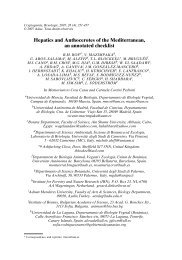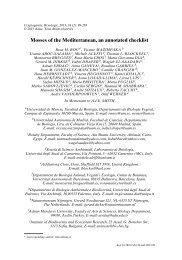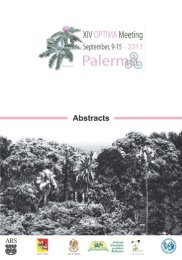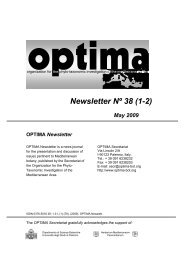Adil GÜNER, Vehbi ESER - optima
Adil GÜNER, Vehbi ESER - optima
Adil GÜNER, Vehbi ESER - optima
You also want an ePaper? Increase the reach of your titles
YUMPU automatically turns print PDFs into web optimized ePapers that Google loves.
IS THERE REALLY A CONFLICT BETWEEN TRADITIONAL AND<br />
MOLECULAR SYSTEMATICS?<br />
Tod F. STUESSY<br />
University of Vienna, Department of Systematic & Evolutionary Botany, Vienna, Austria tod.stuessy@univie.ac.at<br />
Sequencing of the DNA molecule has had numerous impacts on human society, and this<br />
influence continues to widen. Unlocking the hereditary information contained within genes as<br />
well as understanding roles of intergenic regions offers potentials for revealing the basis of the<br />
human condition, amelioration or elimination of disease, regulation of controlled substances, and<br />
many other uses. Within biology, unraveling the genomes of selected organisms has resulted in<br />
new insights on numerous aspects of cell biology, including developmental patterns, and also<br />
evolutionary relationships. It is this last aspect that has come powerfully into systematic biology.<br />
For the first time, we now have a quantitative yardstick that enables us to measure genetic<br />
similarity (or difference) between any two organisms, no matter at what level of the taxonomic<br />
hierarchy. This approach has unleashed thousands of sequencing projects that utilize selected<br />
genes or intergenic regions from the nucleus and/or organelles, often in combination, in consort<br />
with tree-building algorithms that provide more precise views of relationships. Due to these<br />
exciting potentials, many of the new jobs in plant systematics have now been oriented toward<br />
persons with DNA expertise. This has threatened the training of fundamental aspects of our field,<br />
especially monography, for the next generation of workers. This lack has substantial<br />
implications because the monograph is where new hypotheses of relationships are proposed that<br />
can be subsequently tested by DNA data. Without more of the former, eventually there will be<br />
none of the latter. Monography and DNA investigations, therefore, must go hand-in-hand for a<br />
more robust approach to estimating evolutionary relationships. Furthermore, for the study of<br />
many biological questions, such as evolution of characters, origin of adaptations, and coevolutionary<br />
patterns, knowledge of the whole organism will require personal field and<br />
herbarium expertise that can be enhanced, rather than substituted, by DNA information.<br />
Keywords: evolution, DNA data, monography, phylogenetics.<br />
49<br />
61<br />
Oral Lectures






